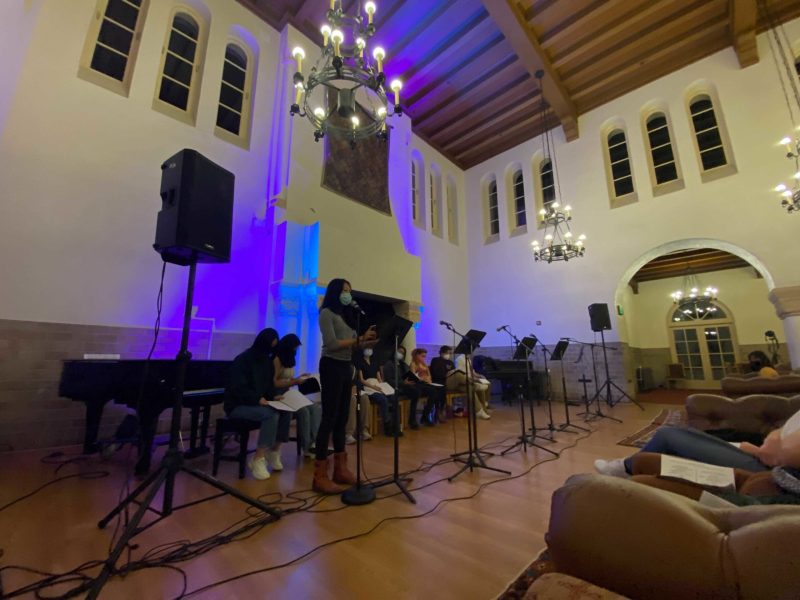Content warning: this article contains reference to assault and bullying.
Friday evening, Toyon Hall: viewers sank into their seats with dread as they watched Elena (Skya Theobald ’24) corner Meilin (Chloe Chow ’23) in the locker room. Elena forced Meilin’s clothes off, made her turn around and cruelly disparaged her body. Dismay clotted everyone’s breathing. Crystal (Georgia Limcaoco ’24) may have averted her gaze, but the audience couldn’t turn away from the horrors of bullying and racism in “White Boy,” a play written by Elaine Lai, a fourth year Ph.D. student in the religion studies department studying Buddhism. Chow and Limcaoco have both written for The Daily.
“White Boy” was the second of two staged readings presented at the second night of the Asian American Theater Project’s New Works Festival. The first, Enya Lu’s ’23 “Inflammation,” features three women confronting the specters of societal expectation at their high school reunion. On Thursday night, “Beyond the Fingertips” by Andrew Yung ’23 and “Alemany” by Jo Leuenberger ’23 were presented.
“Inflammation” asserted most command over the audience when its characters’ reflections climaxed into jolting confessions of honesty. In a weighty conversation about motherhood’s realities and responsibilities, Ximena (Margarita Jamero ’24) said, “there are things more important than being yourself … I had to give birth to a child I didn’t want and figure out how to love him, and I did it.” In an intense deconstruction of her ambitions, workaholism and upcoming motherhood, Arlington (Serena Le Tran ’25), who grew up without financial security, said, “I would rather have had money than love growing up.” The play was propelled by the conversations of inquiry and reassurance trailing these admissions.
The most heartwarming part of “Inflammation” was the three women’s friendship and adamant mutual support and empathy. The alchemy of their differing personalities made for gripping dialogue that jumped between the three like a ball being tossed around in dodgeball. When Jenny (Ada Zhou ’20) frets over being a stay-at-home wife her friends say, “just because your labor doesn’t count for the GDP doesn’t mean it’s not labor.”
Lu’s reflections on feminism and capitalism were part of why she wrote the play. She wanted to examine the “lean in” brand of feminism she was obsessed with in high school and how its ideal woman is one who “works” and conforms to capitalist ideals.
“I found that a lot of my friends had desires that would be considered ‘unfeminist’ or stereotypical of women. They couldn’t figure out how to reconcile that with what they thought they had to be. We are terrified of being stereotypical; we are terrified of being bad women and bad feminists,” Lu told The Daily after the show. “Ultimately, I want my friends to see themselves a little bit more and judge themselves a little bit less.”
The second staged reading, “White Boy,” was similarly ambitious in its capture of the tense nuances of interpersonal relationships. The show centers on the memories of Meilin, juxtaposing her abrasive reality with the innocence of her childhood. The actors were brutally realistic in their depictions of the power dynamics in school environments. The play was also an incisive comment on the failures of our education system; the school splits students into “low,” “average” and “honors” tracks, a system that Meilin’s friend Jesse (Aiyana Washington ’24) suffers under.
“The teachers treat me like I’m dumb,” said Jesse. “Kids like you shouldn’t be allowed to go to school in the first place,” said the teacher (Kyle Wang ’22) to Brian (Matthew Canlas ’24) when he took the blame for Meilin’s plagiarism. Between parental neglect and disrupted friendship, the play is a story of the ugliest parts of coming-of-age. When Jesse informs Meilin that she is moving away, effectively ending their friendship, Jessa says with jarring finality that “Nothing’s fair.”
“The title is ‘White Boy,’ and it’s written by me, someone who is not a white boy,” Lai told The Daily after the show. The play was borne from Lai thinking about actions that non-white people take to assimilate or achieve upward mobility, how they internalize the “myth of the white boy” and how it causes them to betray certain parts of themself that are very innocent and authentic.
“It’s about that moment of childhood ending, moving into the indoctrination of society, learning to inculcate those values of this myth of the white boy and how that destroys your soul in some ways,” said Lai. The reading exhorts us all to think about “how all of us are being harmed by the myth of the white boy.”
New Works has been active at Stanford for three years. Their first show was in the winter of 2020 at Kimball Hall; it was a much smaller and more intimate one-afternoon show. “Last year everything was virtual, of course. So this really feels like the first time we’ve been able to have a larger production, which was incredible to watch,” said Wang, who co-produced the festival with Chow.
Editor’s Note: This article is a review and includes subjective opinions, thoughts and critiques.
